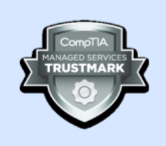Simple steps to protect your online presence

With cyberthreats on the rise, businesses must prioritize online security to safeguard sensitive information and maintain customer trust. The good news is that understanding the basics of online security can go a long way in keeping your data safe from prying eyes. Here are some essential tips to help your business navigate the online world securely.
Create strong, unique passwords
Passwords are your first line of defense against unauthorized access to your accounts and sensitive information. This is why you should avoid using easily guessable passwords such as “123456” or “password.” Instead, create strong passphrases. A passphrase is a string of four or more random words. This extra length and randomness make them much harder for cybercriminals to crack but still easier for you to remember than a jumbled mess of characters.
For maximum security, use a different passphrase for each of your accounts. This way, if one account gets compromised, your other accounts are still safe.
Tip: Remembering multiple complex passphrases can be a challenge. Consider using a password manager, which stores all your passphrases in one place. This makes your passphrases easily accessible while keeping them safe from prying eyes.
Implement multifactor authentication (MFA)
MFA adds an extra layer of security to your online accounts by requiring additional verification beyond just a password, such as a one-time code sent to your phone or a fingerprint scan. By enabling MFA, even if someone obtains your password, they won’t be able to access your account without fulfilling the additional verification requirements.
Tip: Whenever possible, enable MFA on your important accounts, including email, banking, and cloud services.
Keep software and systems updated
Cybercriminals often exploit weaknesses in outdated software to gain unauthorized access to systems. To stay protected, regularly update your software, operating systems, and applications because these updates often include essential security patches that fix those vulnerabilities.
Tip: Set up automatic updates on all your devices so you don’t have to remember to update manually, and your devices stay continuously protected without any extra effort from you.
Use secure Wi-Fi networks
When accessing the internet, it’s important to use secure Wi-Fi networks. Public Wi-Fi in airports or coffee shops can be targeted by cybercriminals. Instead, use encrypted Wi-Fi connections, which require a password and scramble your data, making it unintelligible even if intercepted.
For an extra layer of security, consider using a virtual private network (VPN). A VPN encrypts all your internet traffic, creating a secure tunnel between your device and the internet, regardless of the Wi-Fi network you’re on.
Tip: Configure your devices to automatically connect only to trusted Wi-Fi networks that you know and use. Additionally, disable the option to connect to open networks to avoid accidental connections to unsecured Wi-Fi.
Conduct security awareness training for employees
Employees are often the weakest link in an organization’s cyber defense, as they may inadvertently fall victim to phishing scams or unknowingly compromise sensitive information. However, regular training sessions can empower your employees to recognize and respond to cyberthreats effectively.
Tip: Simulate phishing attacks to test your employees’ preparedness and reinforce training.
By following these simple yet effective tips, you can significantly enhance the online security posture of your business and minimize the risk of falling victim to cyberthreats. Remember, investing in online security is not just about protecting your data — it’s also about safeguarding the reputation and integrity of your business in an increasingly digital world.















